Educational Organisation Management Systems (EOMS) Effectiveness During Covid-19 Pandemic In Universiti Selangor
Abstract
The higher education system in this world has been challenged by the Covid-19 pandemic since early 2020 and has disturbed the normal operation of education services including UNISEL. Despite the difficulties in the new normal of strict Standard Operating Procedure (SOP) and Movement Control Order (MCO) imposed by the government, UNISEL operations especially in academic services and teaching & learning have continued as usual throughout the MCO. UNISEL has managed to sustain its operation and successfully faced the challenges. This sustainability can be well connected to the UNISEL's implementation of ISO 21001:2018 Educational Organization Management Systems (EOMS). The EOMS standard provides a general ground of education management system that can be used in any condition. The effectiveness of the EOMS implementation can be proven by the students' satisfaction survey. The instruments of this survey were divided into five aspects which are students’ demographic, teaching and learning, facilities, support services, student’s activities, and overall experience as a student in UNISEL. The questionnaire consists of 31 and the likert scale used was ranked from 1 to 5 for the students’ satisfaction survey. The results for each aspect were then compared with previous years’ data. The comparison analysis showed that there was no significant satisfaction reduction for the 2021 survey and there was a slight improvement in the teaching and learning aspects as compared to the previous year. The study proved that the EOMS standard is robust and can help education providers to sustain in challenging conditions like pandemic Covid-19.
Keywords: Higher learning institution, ISO 21001:2018 Educational Organization Management Systems (EOMS), pandemic Covid-19, student’s satisfaction
Introduction
Universiti Selangor (UNISEL) has implemented a management system for the whole operation of the university based on International Standard ISO 21001:2018 Educational Organisation Management Systems requirements since early 2018. UNISEL had received the ISO certification on 15 November 2018. Standard ISO 21001 is an extension of ISO 9001:2015 which was specially developed for an educational organisations. The standard comprises 10 main clauses of management tool for organizations to provide educational products and services (International Organisation of Standardisation, 2018). The standard framework adapts the management cycle of Plan Do Check Act as shown in Figure 1.
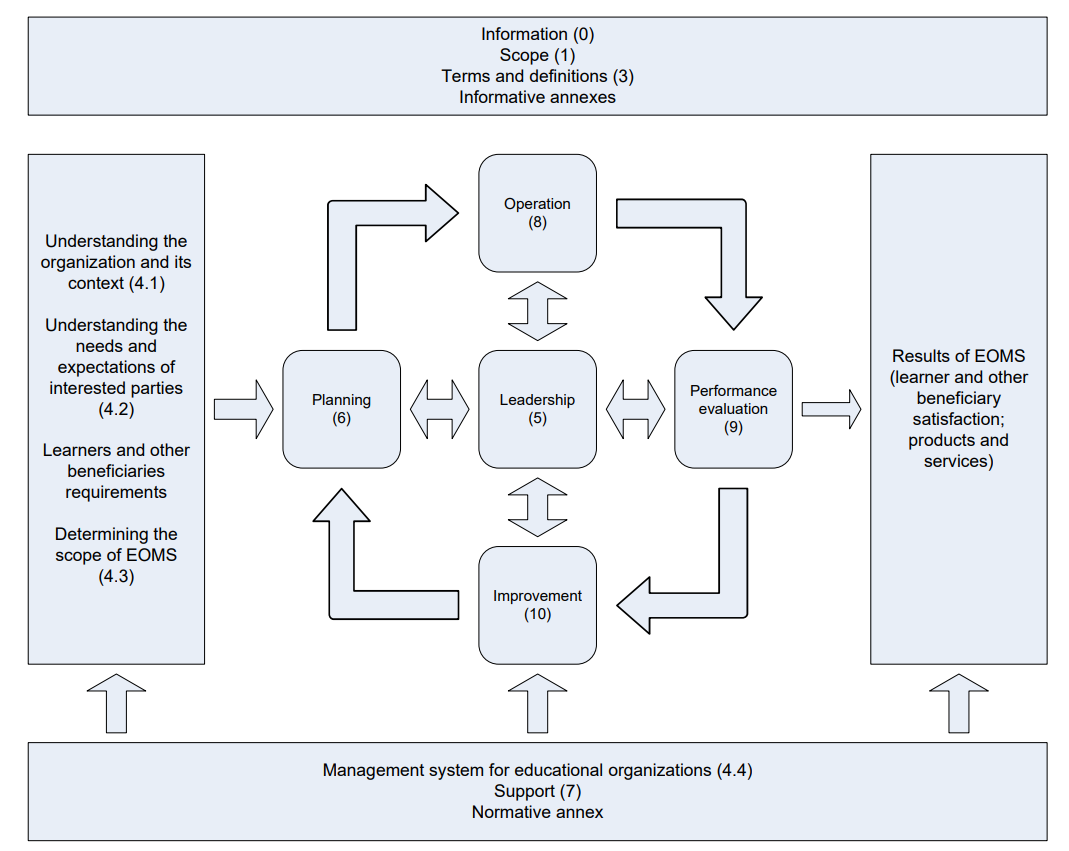
A management study reported by (Gilbert, 2020) concludes that ISO 21001 standard may provide a useful tool for higher education providers to embrace quality consistency in their operations. With the same respect, (Wibisono, 2018) highlighted the significant impact of ISO 21001 implementation for an educational organisation. They studied the comparison of ISO 21001 and ISO 9001:2015 in term of the breadth and depth of the standards for educational organisation. They found that the scope and the requirements for ISO 21001 are deeper and broader. Other study on the ISO 21001 implementation had been done by Kovalenko et al. (2020). Based on their study, they concluded that the implementation of the standard in the management system can steadily improve the organisation performance and enhance the satisfaction of the learners, personnel and other interested parties. This is also supported by (Kayyali, 2021). ISO 21001 should also be adopted by Pesantren College in Indonesia to transform the college in the era of Industrial Revolution IR 4.0 (Tohet & Eko Cahyono, 2020).
Covid - 19 pandemic caused a very challenging situation the educational organisations including UNISEL. Movement Control Order (lockdown) forces all students and staff to stay at home. This restriction has changed teaching and learning into online totally. Nassr et al. (2020) and Al-Kumaim et al. (2021) studied the difficulties of Malaysian university students based on their experience during the lockdown. On the other hand, (Sia & Abbas Adamu, 2021) presented the challenges and impacts of the pandemic in Malaysia for higher education institutions. The highlighted issue is on the preparation to face the sudden changes. Without a proper management system, it will be hard for any educational institution to encounter new challenges and requirements during the pandemic.
The success of an education organisation operations during a pandemic can be measured based on the student satisfaction survey. There are some studies had been published on students' satisfaction during the pandemic (Almusharraf & Khahro, 2020; Malkawi et al., 2021; Osmani, 2021). The effectiveness of UNISEL operation during the pandemic can be seen through the results of students' satisfaction survey that had been conducted to all students. The results of the survey during the pandemic were compared with the previous years to see the effectiveness of ISO 21001 implementation in providing consistency in the management system. The finding and survey methodology are presented in the next sections
Problem Statement
The higher education system has been significantly affected by the Corona Virus Disease 2019. The higher education providers in Malaysia were required to follow the standard operating procedures enforced by the policymaker which gave major impacts on the students. These impacts include social distancing, quarantines, isolation measures, campus closure, border closures, and travel restrictions. Universities were forced to close and had to switch the learning method towards online learning and physical customer services to online services. Hence, this decision influences students’ satisfaction towards university operation.
Online learning is an effective alternative method for both students and lecturers to continue teaching and learning during a lockdown. However, there are some issues that require attention and consideration by the educational institutions when implementing an online activity. Berita Harian has reported about 52% of students in Sabah, Malaysia has limited accessibility to the internet due to inadequate infrastructures (Berita Harian, 2020). Inadequate online learning infrastructures and limited accessibility to the internet make the online learning process harder for the students, (Lee, 2020) especially in more rural and isolated areas in Malaysia. During online learning, the students experienced difficulty in interacting with their lecturers and friends, which greatly affected their studies. Therefore, it is required to conduct a comprehensive study to evaluate the effectiveness of ISO EOMS implementation by identifying student’s satisfaction towards the online operation.
Research Questions
The research questions for this study are as follows:
What are the student’s satisfaction levels towards online learning activities and online services provided by UNISEL during COVID-19 pandemic?
What are the main factors that contributes to online learning and services satisfaction among UNISEL students?
Are there any differences between learning activities and services provided before and during the pandemic?
Are there any effectiveness of the implementation of ISO 21001:2018 Educational Organization Management systems contribute to student’s satisfaction in online learning and services provided by UNISEL?
Purpose of the Study
The purpose of this study is to measure the effectiveness of EOMS implementation towards UNISEL operations especially in teaching & learning as well as the academic services. EOMS generally provide a ground standard in every aspect of teaching and learning operation. In addition, this standard requires active participation of the customers and therefore intensive communication should be maintained. The process can be demonstrated through a student’s satisfactory survey. In this study, the overall objective is to evaluate the influence of ISO EOMS practices during the COVID-19 pandemic through a student’s satisfaction survey in UNISEL. The specific objectives are:
To identify the level of effectiveness of a service provided to students
To analyse students evaluation of education services at UNISEL before and during covid-19 pandemic.
To compare student’s satisfaction towards learning activities and services provided before and during the pandemic
To establish the effectiveness of ISO EOMS implementation towards student’s satisfaction
Research Methods
This study is intended to identify the relationship of implementation of EOMS with students’ satisfactory level. The survey was conducted through an online platform and all students from Bestari Jaya and Shah Alam campuses were required to fill up the survey.
Survey Instrument
The survey instruments were divided into five sections which consist of 31 items and the likert scale was used to represent student’s satisfaction. The questionnaire was organized according to the respected domain as follows:
1. Domain A: 9 items on respondent’s demographic profile
2. Domain 1: 6 items on teaching and learning
3. Domain 2 : 8 items on support service and facilities
4. Domain 3 : 5 items on student’s activities
5. Domain 4 : 3 items on overall experience.
Reliability of Items
Instrument reliability is “the consistency of measurement” (McMillan & Schumacher, 2001). Reliability is the degree to which a scale or instrument consistently measures whatever it wants to measure. Reliability is expressed as a coefficient between 0 and 1.00. The higher the coefficient, the more reliable the instrument is. Cronbach’s alpha is the most common for attitudinal measures and it estimates internal consistency by determining how all items on a test relates to all other items and to the total test-internal coherence of data. If the value exceeds 0.60, then the scale is said to have internal consistency, hence a set of items is considered reliable. Table 1 shows the coefficient of Cronbach’s alpha computed for the 22 items in each section of the questionnaire.
Findings
The primary data collected from the online questionnaire survey was coded and analysed using Statistical Package for the Social Sciences (SPSS) version 20.0 and Microsoft Excel 2010. The analysis of the findings was divided into four sections below:
Background of Respondent
This section reported demographic information of the respondents who participated in this study. The total number of students that participated in this survey were 5822 for both campuses Bestari Jaya and Shah Alam Campus. Table 2 represent the demographic profile of the participate respondent.
Teaching and Learning
The first domain discussed in this section is students’ satisfaction towards teaching and learning activities. The level of student satisfaction related to teaching and learning services is measured based on the teaching and learning process, especially related to online classes. Table 3 shows the percentage of respondents' satisfaction related to the learning and teaching process during this critical period. The results indicated that the majority of the respondents have the highest level of satisfaction (82%) towards the teaching and learning process, the class schedule was good at the university (78.5%), received feedback on work done by the lecturers (78.1%), effective online classes (76.95), sufficient equipment to face online learning (72.7%) and having adequate internet access for online learning (71.2%).
On average, 76% of respondents are very satisfied with the teaching and learning process that has been done by the lecturers. A comparative analysis from the previous year was also conducted to identify the level of student satisfaction after the ISO was implemented. Figure 2 shows a comparison of the percentage of respondents ’satisfaction based on the questions given. From this finding, it can be concluded that the level of satisfaction for each questionnaire before the pandemic and during pandemic has shown an improvement, especially in technology characteristics as in questions 5 and 6.
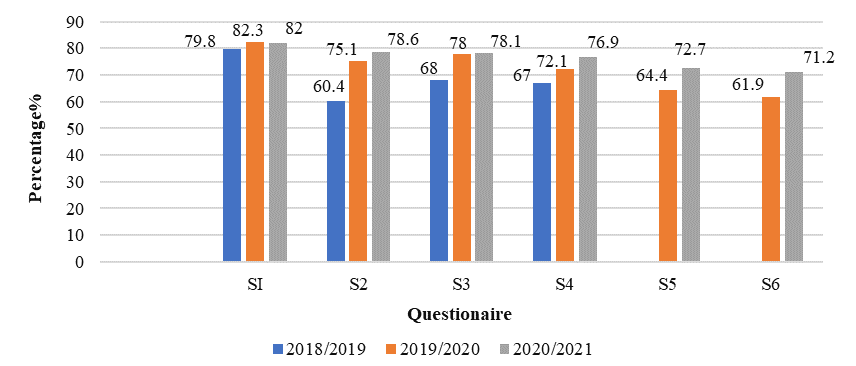
Support Services and Facilities
The second domain discusses in this section is about services and facilities which play an important role in students’ satisfaction. Table 4 shows the findings of the student’s satisfaction regarding the support and services provided.
The results show that there are some aspects that achieve a satisfaction level of less than 75% and it needs to be improved in ensuring student satisfaction is given priority. The diagram in Figure 3 shows the differences in student satisfaction findings since the implementation of ISO EOMS.
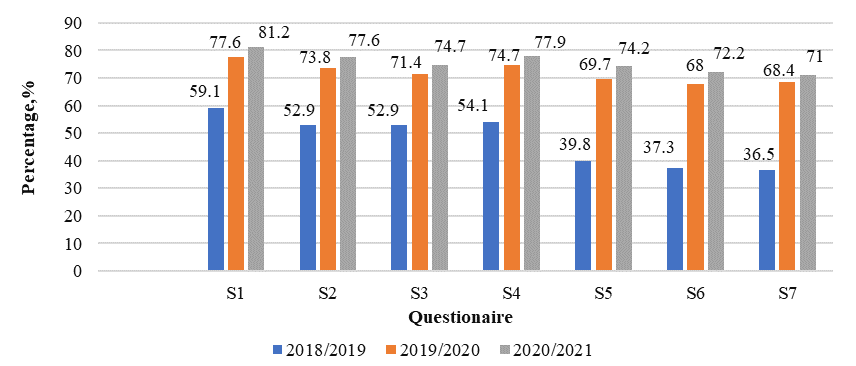
Student’s Activities
Student satisfaction related to activities and assistance during this pandemic period is translated based on the results in table 5.
As a result of the findings, it was found that less than 70% of students at UNISEL agreed that financial assistance was provided to carry out student activities. In addition, only 68% of students agreed with the statement that student voices are taken into account in determining the implementation of policies involving students. Figure 4 shows a sustainable trend in student satisfaction related to student activities since ISO EOMS was implemented.
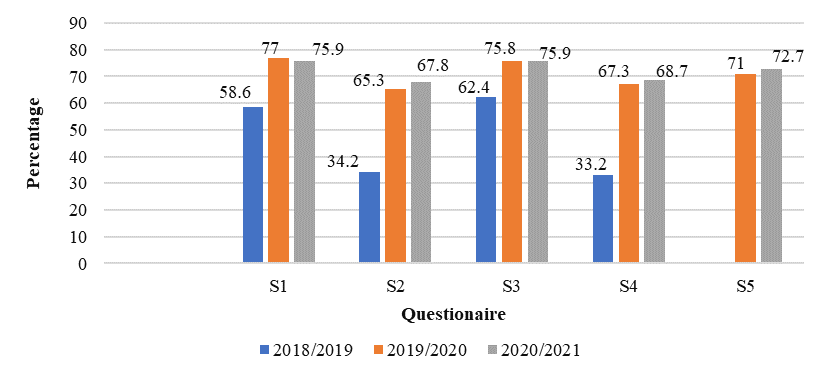
Students’ Overall Experience
Figure 5 below depict that 75.9% of students were satisfied with the services offered at UNISEL. Only 24.1% of them were fully dissatisfied throughout their studies in the year 2020/2021 in UNISEL. The results of the study also found that 83.1 % of students were interested in continuing their studies at UNISEL while 88.1 % of students will recommend UNISEL to others as in Figure 6.
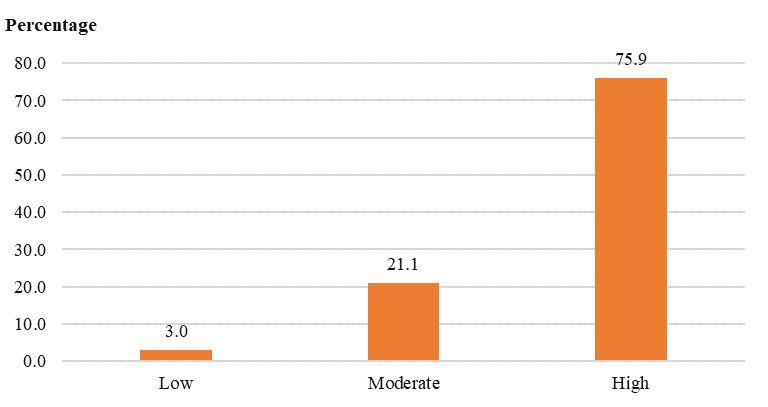
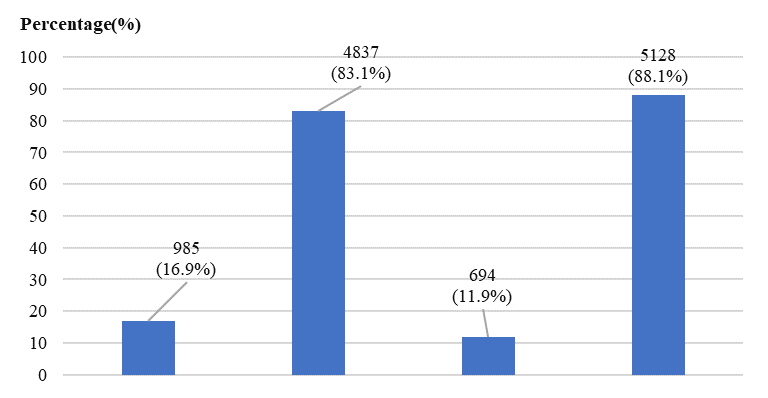
Conclusion
The main purpose of this study is to investigate the effective implementation of ISO EOMS through a student’s satisfaction survey. The study reveals sustainable satisfaction in several domains such as teaching and learning, support services and facilities as well as student’s activities that have been provided before the pandemic and during pandemic COVID-19. Due to the implementation of EOMS in practicing the standard operating procedures, UNISEL has managed to sustain its operation. The study proved that the EOMS standard is robust and can help education providers to sustain in challenging conditions like pandemic Covid-19.
In addition, from this survey, less than 10% of students were dissatisfied with the online learning and online services provided in UNISEL. Even though the respondents are satisfied with all the domains, some improvements should be implemented especially in terms of quality of the interaction with UNISEL’s officer in order to enhance the delivery of education services in UNISEL. The continuous quality of improvement is an important aspect in ISO EOMS to ensure the education operations are put in place and therefore will enhance student’s positive satisfaction that lead to good quality of the educational process.
Acknowledgments
This survey is one of the feedback channel from the learners for management system improvements. Authors would like to thank all the students for participating in this survey and the UNISEL management staff for their support throughout the survey processes. Special appreciations to CGQA and survey committee to make this survey successful.
References
52 percent of Sabah students do not have internet access (2020, 8 May). Berita Harian Online. https://www.bharian.com.my/berita/nasional/2020/05/686499/52-peratus-pelajar-sabah-tiadaakses-internet
Al-Kumaim, N. H., Mohammed, F., Gazem, N. A., Fazea, Y., Alhazmi, A. K., & Dakkak, O. (2021). Exploring the Impact of Transformation to Fully Online Learning During COVID-19 on Malaysian University Students’ Academic Life and Performance. International Journal of Interactive Mobile Technologies, 15(5), 140–158. DOI:
Almusharraf, N. M., & Khahro, S. H. (2020). Students’ Satisfaction with Online Learning Experiences during the COVID-19 Pandemic. International Journal of Emerging Technologies in Learning, 15(21), 246–267. DOI:
Gilbert, D. D. (2020). ISO Alongside, Instead, or Inside? The potential of ISO 21001:2018 to change and challenge higher education accreditation. International Journal of Business and Applied Social Science, 6(10), 45–52. DOI:
International Organisation of Standardisation. (2018). ISO 21001:2018 Educational organizations management systems for educational organizations - Requirements with guidance for use (ISO Standard No. 21001:2018).
Kayyali, M., & Khosla, A. (2021). Globalization and Internationalization: ISO 21001 as a Trigger and Prime Key for Quality Assurance of Higher Education Institutions. International Journal of Applied Science and Engineering, 9(1), 30954. DOI:
Kovalenko, S. M., Romelashvili, O. S., Zborovska, T. V., & Blagun, O. D. (2020). General Aspects of Introduction of Management Systems in Educational Organizations in Pursuance of ISO 21001:2018. Management, Economy and Quality Assurance in Pharmacy, 4(64), 4–9. DOI:
Lee S (2020, 16 June). Sabah student stays overnight in tree to get better Internet connection for online university exams. The Star. https://www.thestar.com.my/news/nation/2020/06/16/sabah-uni-student-stays-overnight-in-tree-to-get-better-internet-connection-for-online-exams
Malkawi, E., Bawaneh, A. K., & Bawa’aneh, M. S. (2021). Campus off, Education On: UAEU Students’ Satisfaction and Attitudes Towards E-Learning and Virtual Classes During Covid-19 Pandemic. Contemporary Educational Technology, 13(1), 1–14. DOI:
McMillan, J. H., & Schumacher, S. (2001). Research Education: A Conceptual Introduction (5th Ed.). Longman.
Nassr, R. M., Aborujilah, A., Aldossary, D. A., & Aldossary, A. A. A. (2020). Understanding Education Difficulty During Covid-19 Lockdown: Reports on Malaysian University Students’ Experience. IEEE Access, 8, 186939–186950. DOI:
Osmani, F. (2021). Analysis of Students Satisfaction with Virtual Education in Medical Science University during the Pandemic Outbreak of COVID-19. International Journal of Assessment Tools in Education, 8(1), 1–8.
Sia, J. K. M., & Abbas Adamu, A. (2021). Facing the unknown: pandemic and higher education in Malaysia. Asian Education and Development Studies, 10(2), 263–275. DOI:
Tohet, M., & Eko Cahyono, D. (2020). Peningkatan Mutu Perguruan Tinggi Pesantren Melalui ISO 21001 :2018 [Improving the Quality of Pesantren College through ISO21001:2018]. MANAGERE : Indonesian Journal of Educational Management, 2(2), 157–170. DOI:
Wibisono, E. (2018). The new management system ISO 21001:2018: What and why educational organizations should adopt it. In Proceeding of 11th International Seminar on Industrial Engineering and Management (pp. 66–73).
Copyright information

This work is licensed under a Creative Commons Attribution-NonCommercial-NoDerivatives 4.0 International License.
About this article
Publication Date
31 October 2022
Article Doi
eBook ISBN
978-1-80296-958-0
Publisher
European Publisher
Volume
3
Print ISBN (optional)
-
Edition Number
1st Edition
Pages
1-802
Subjects
Multidisciplinary sciences, sustainable development goals (SDG), urbanisation
Cite this article as:
Mat Rusni, I., Ismail, H., & Mohd Kasim, C. M. (2022). Educational Organisation Management Systems (EOMS) Effectiveness During Covid-19 Pandemic In Universiti Selangor. In H. H. Kamaruddin, T. D. N. M. Kamaruddin, T. D. N. S. Yaacob, M. A. M. Kamal, & K. F. Ne'matullah (Eds.), Reimagining Resilient Sustainability: An Integrated Effort in Research, Practices & Education, vol 3. European Proceedings of Multidisciplinary Sciences (pp. 466-476). European Publisher. https://doi.org/10.15405/epms.2022.10.45

